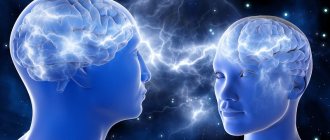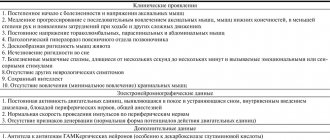Thinking is determined by a person’s needs, his interests, motives, tasks, goals, that is, a person’s thinking is purposeful in nature, associated with the needs and motivation of a particular individual.
A person’s individual thinking is directly related to his mind, but the concept of mind is broader: it includes features of both thinking and other cognitive processes. Thinking is the processing of information, a set of interconnected sensations, thoughts, and images. As a result, it gives us an idea of how everything in nature relates to each other. Thinking is a tool of the mind, one of its prerequisites. The mind is the repository of knowledge, intelligence, intuition, personality traits (its beliefs, positions, programs), it determines a person’s ability to think and solve emerging problems.
A person’s upbringing, his training, the chosen type of occupation, preferences, and the uniqueness of life constitute the features of the individual characteristics of a person’s thinking. Age, the type of higher nervous activity, and the ratio of the first and second signaling systems are also important. You can read more about types of thinking in our blog:
Two levels of individual characteristics of human thinking
Individual characteristics of human thinking in psychology are analyzed at two different levels: the individual and the personality.
When talking about a person as an individual, we consider certain neurodynamic characteristics and processes. We are talking about the following:
- How do the first and second signaling systems relate and, accordingly, what type of thinking, artistic or mental, predominates.
- How nervous processes proceed: the speed of acquiring knowledge, mental performance, and human sensitivity depend on their strength or weakness. The speed of thinking and its flexibility or, on the contrary, difficulty depend on their activity or, on the contrary, inertia.
Personal factors of thinking include:
1. Installation (operational and semantic).
Operating is the readiness to take some steps, while relying on previous experience and assuming the development of events taking into account existing conditions.
Semantic – a higher level setting. It acts as a kind of filter that corrects operating settings. Meaningful attitudes determine the content, pace of development, and performance of the individual as a whole.
2.Motives. They activate and structure thinking. Meaningful motivation imparts valuable personal meaning to thinking.
3.Emotions. They help evaluate information, activate thinking, reduce the time required to find a solution to a problem, and generate new information. perform four functions: evaluative, activating, the function of heuristics (techniques that reduce the time of searching for a solution to a problem), the function of a generator of new information.
4.Personal past experience. It is concentrated in a person’s knowledge and determines the characteristics of his thinking. Only well-structured knowledge turns a person into an intellectual and distinguishes him from an amateur.
5. Socio-psychological factors. Thus, the authoritarianism of teachers and parents gives rise to stereotypical thinking, absence or low level of creativity. On the contrary, parity in relationships creates the preconditions for independence, criticality, originality of thinking, the ability to take into account the position of another person and, as a result, for creative productivity.
Criticality
A person with a critical mind carefully checks his assumptions, not accepting every mental decision that comes to him as truth until he is sure of its correctness. The critical mind is an organized mind that makes extensive use of the imagination, relying on it to create something new. And at the same time, he has the ability and ability to hold back the work of fantasy, which leads along the wrong path to unrealistic, unrealistic projects.
Independence and criticality of the mind are an excellent tandem of prerequisites for creative, innovative activity of an individual.
Basic qualities of human thinking
Individual characteristics of thinking in psychology are usually determined by the following qualities:
- Logicity is the ability to follow a certain sequence when considering a question, i.e. order determined by logic. This is the ability to think, prove the correctness or fallacy of a conclusion, and check the course of reasoning.
- Depth of thinking (thoughtfulness) is the ability to find the essence, the main thing, the most essential, often hidden. This is the ability to understand not appearance, but essence; formulate an idea based on a variety of facts, understand as a whole, notice patterns, understand the causes and anticipate the consequences.
- Broadness of thinking is the ability to consider problems from all sides, interconnected with other phenomena and sufficiently critical, covering different areas of knowledge.
- Flexibility (plasticity) – the ability to change ways of solving problems in changing circumstances. Flexibility of thinking allows us to consider phenomena and objects, relationships and properties in different aspects. If conditions change, flexible thinking allows you to restructure the initial data and use their relativity. When new inputs are received, plans change to take them into account, as a result of which the plan for solving the problem also successfully changes. This property is associated with the mobility of thought processes.
- Inertia of thinking is the opposite of flexibility. Inert thinking does not look for new ways, preferring to reproduce what has already been learned and known, that is, it is a tendency to think in stereotypes when a person experiences difficulties when it is necessary to switch to another system of actions.
- Originality of thinking is a person’s ability to pose new questions; use known experience, and at the same time show independence of judgment and find an independent solution. Independence, originality of thinking presupposes self-criticism (knowledge of one’s strengths and weaknesses). Independence also reveals the creative nature of thinking.
- Critical thinking is the desire to evaluate objectively, apply only proven judgments, and carefully check objections before discarding them. It involves the ability to identify the advantages and disadvantages of reasoning and prove the truth of the propositions put forward.
- Speed of thinking is the speed at which thought processes occur. It manifests itself in the amount of time needed to solve problems and in the ease of implementing ideas. Quick thinking is especially important in critical situations, when you need to make a decision very quickly and take action.
- Clarity of thinking is simplicity, sincerity, and uncomplicated expression of thoughts.
- Inquisitiveness is the need to find the most suitable solution to a problem.
- Wit is the ability to quickly navigate the material and find the right solutions to problems.
- Initiative is the desire to search and find a solution to a problem independently, in a wide variety of ways and means.
- Originality is the ability to generate new ideas that are different from those already familiar.
In psychology, the following are also identified as individual characteristics of thinking:
- The pace of development of thought processes, which is understood as the least amount of exercise that is required in order to understand and generalize the principle of the solution.
- Economy of thinking is the number of sequential reasoning that allows one to learn a new pattern.
- Stability is the preservation of a focus on previously identified important features and generally accepted patterns.
- Awareness is the ability to verbally express both the result of the work done and the techniques that were used.
All individual characteristics of a person’s thinking are important for the correct assessment of his abilities and knowledge. But the fundamental sign of thinking is the ability to identify the main thing, the most essential, in order to then, thinking independently, move to new generalizations. Thinking is much more than a statement of an event or a fact. His path is to delve into the essence of a phenomenon and discover the general law of development of all somewhat homogeneous phenomena, no matter what their external differences.
Cognitive qualities of thinking are individual in nature and undergo changes with age, but the main thing is that they can be corrected, their performance can and should be improved. Thanks to the plasticity property of the brain, its cognitive functions can be developed at any age. Thinking and attention, memory, perception can be trained daily, with pleasure and benefit using exercises for the development of thinking in adults.
A little about the thought process
We understand the world through sensations and perceptions and only then through thinking. The function of the latter is to expand the boundaries of knowledge by going beyond the boundaries of feeling. That is, it helps, through inference, to reveal what we cannot know based solely on perception.
Thinking paves the way to knowledge that cannot be obtained in any other way. This is a problem solving process. The latter involve questions to which there are no direct answers. They are hidden in the source data. By transforming them through logic, a solution can be found.
Thinking is also defined as the process of generalized cognition of reality. That is, obtaining general information about it occurs at the level of terms.
Mental problems are solved using:
- Analysis. It is a mental operation by which a whole is divided into its component parts. This is where the research begins.
- Synthesis. Involves the mental and practical process of combining fragments into a single picture. This operation is the opposite of analysis, but they are both complementary. If information about a problem is unclear, analysis is required first.
- Comparisons. Objects are compared to find common features and differences.
All people are individual and have different ways of thinking.
How to do it
There are several recommendations. Let's look at them:
- The main thing is to set goals for yourself! At the same time, they should be interesting.
- Expand your vocabulary. Read books, study foreign languages. Thus, you will learn to express your thoughts clearly and correctly, thereby developing your mind.
- Draw. Using a bright palette, you can depict your future, dreams, and emotional state on a piece of paper. Painting develops imagination and thinking.
- Solve puzzles, puzzles, crosswords.
- Listen to classical music.
- Write poetry, and if possible, poems. This process contributes to the development of not only memory, but also imagination and creativity.
- Get involved in cooking. Depart from the recipe, use your imagination and creativity.
- Play checkers and chess with your friends. Don't you know how? Then this is a great opportunity to learn it.
- Solve math problems to develop analytical thinking, which improves your mind.
- Learn a new word every day. It doesn’t matter what area you learn the term from, the main thing is knowledge and self-improvement.
And think for yourself. Today there are no problems with access to any information, thanks to the Internet, where you can even find solutions to school problems. Try not to turn to different sources for answers. The less we begin to think, the weaker our memory and mind develop. And, of course, we don’t forget about proper nutrition and getting rid of bad habits. Rest more and get enough sleep, play sports, walk in the fresh air, enjoy life, cheer yourself up and you will succeed.
Sequence of thought
Another quality of the human mind. This is a strictly consistent mind. Manifests itself in the ability to follow a strict logical chain in the study of a phenomenon, as well as the natural reasoning of thoughts and a clear logical process.
A person of consistent mind in his thoughts sticks to one problem, without jumping to another. When studying a difficult problem, one follows a specific method of consideration. Having formed thoughts, he traces the order in which information is released, adhering to the planned plan. There are no logical errors in his thinking. If he considers certain conclusions to be true, then without fear or fear he draws all the conclusions that emerge from them. He strives to find more evidence for his judgments.











